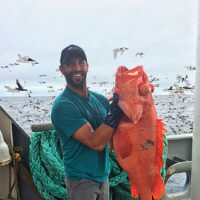University of Oregon, B.Sc. Marine Biology
I was born and raised in Oregon. I grew up playing in the mountains and backcountry of the Pacific North West, and that’s what helped foster my love for the outdoors. On any given day off, you can find me out whitewater kayaking, backcountry skiing or pretty much any other outdoor activity. As a kid I visited the coast often and became fascinated with the oceans. My fascination and curiosity grew and grew, so I pursued a B.S. degree in Marine Biology from the University of Oregon. After graduation I worked for 4 years as a fisheries observer for the West Coast Groundfish Observer Program. While working as an observer, I met John Gauvin who hired me for a small project in the Bering Sea, and then later would employ me full time after observing. I spent three years working on a few special projects with Mr. Gauvin. One of which was a salmon excluder exempted fishing permit in the pollock fishery primarily testing different style excluders using cameras to monitor escapement and behavior throughout the net and codend. I was also a part of the larger scale Halibut Deck Sorting project among the groundfish fleet in the Bering Sea. This project is partially responsible for inspiring the idea behind my thesis.
My thesis project, “Examination of Catch Accounting for Trawl-Bycaught Red King Crab in the Bering Sea”, continues my involvement with fisheries and fisheries management from the past 7 years. I will be working with trawl-bycaught red king crab (RKC) and looking at two specific areas of interest. My primary focus will be looking at RKC prohibited species catch (PSC) estimation based on fisheries observer sampling. Currently, RKC PSC for groundfish fisheries is estimated by extrapolating NMFS observer program sub-sample data from a given haul to the entire haul, trip, vessel, and finally, fishery sector. The extent to which this approach adds variability and/or bias to these estimates is unknown. This uncertainty is likely especially pronounced given the high zero-inflation and relatively low abundance of RKC bycatch data. To quantify this, we will collect whole-haul census data for RKC. Over the course of a fishing season, we will gather census data from multiple vessels which will allow us to compare it to the extrapolated number acquired from observer sub-sampling.
Data will also be collected on bycaught red king crab sex, size, maturity, and shell condition. In addition, haul-level data will be collected on bottom water temperature, tow depth, tow duration, tow speed, and target species catch. The impacts of these covariates on the relationship between red king crab subsample-based PSC estimates and actual red king crab catch will be explored. We aim to understand the relationships between the spatial ecology of PSC species, extrapolation uncertainty, and PSC estimates. The latter section of my thesis work will be working with a few red king crab on deck on a small project in an effort to quantify delayed discard mortality rates. This approach relates observed vitality, injury and reflex impairment to mortality probability. If this approach is successful, it can be used to identify variables that are correlated with increased mortality and to evaluate the feasibility of reducing discard mortality by ‘deck-sorting’ (i.e., discarding the crab on deck rather than in the factory).
Funding for this work is provided by the Groundfish Forum via the Alaska Education Tax Credit Program.

